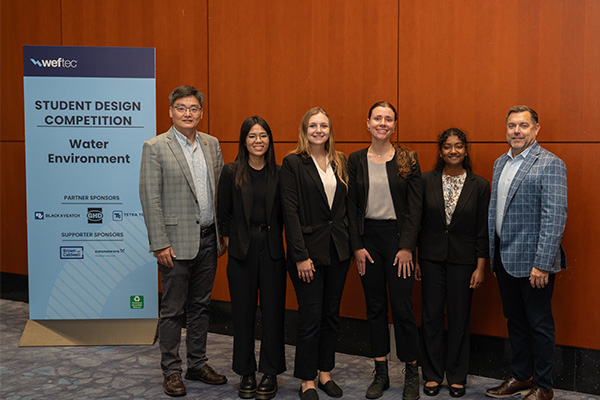Class Acts: Ping-I (Dennis) Chou
The COVID-19 pandemic fueled Chou's interest in nanoplastics' effect on the environment

During the pandemic, Ping-I Chou observed the ubiquity of medical waste as face masks became a common sight littering the ground. Chou, who goes by the first name Dennis, saw a new door open where many would only see an overwhelming challenge.
Somebody needed to study just what happens to all those polypropylene face masks left unattended. And Chou was in a unique position to do just that, having been selected as a McDonnell International Scholars Academy fellow and working as a doctoral student researcher in Professor Young-Shin Jun’s environmental nanochemistry laboratory in the McKelvey School of Engineering at Washington University in St. Louis.
After he graduates this summer, Chou plans to move to Oregon to join Intel, one of the world’s largest semiconductor manufacturers, as a module development engineer, where he will continue to use his nanochemistry and photochemistry expertise in semiconductor design and manufacturing. But first, he talked about some of the fascinating work he has done during his time at WashU.
How did you end up studying environmental nanochemistry?
After earning my undergraduate and graduate degrees from National Chung Hsing University and National Taiwan University, I contacted Professor Jun because of her expertise in water chemistry and nanochemistry. Then I was selected as a McDonnell International Scholars Academy fellow. But then, COVID hit.
Because of COVID-19 we have so much face mask waste. When these masks enter the environment, like in rivers and oceans, it can be degraded by sunlight and release micro or nano plastics into water. I wanted to understand how sun exposure changes the surface chemistry of the materials. I found sun exposure degrades the mask materials in a way that speeds up the manganese oxidation and the formation of manganese oxide nanoparticles on mask surfaces, which can further affect the transport of nutrients and heavy metal in the water. This research can help better understand the fate and transport of plastic wastes and highly reactive nanoparticle formation in the environment.
What is your favorite part of being in St. Louis?
Much like in Japan, Korea and America, baseball is the national sport of Taiwan. I grew up watching Major League Baseball, and now I’ve come to the right place.
I really like baseball, I think that’s the most enjoyable aspect of living in St. Louis, outside of the lab. Watching baseball in person in a stadium is a totally different experience. I really enjoy the proximity of WashU to Busch Stadium.
What gives you hope for the future?
I believe knowledge is power. I was really inspired by the knowledge I learned working in Professor Jun’s lab. Having a positive mindset is critically important.
My time as a McDonnell Academy scholar helped me make invaluable connections to other international scholars and ambassadors from different backgrounds. In the McDonnell Academy, I developed a global mindset and a sense of social responsibility. The resources and the experiences of the McDonnell Academy really made me hopeful for the future.



